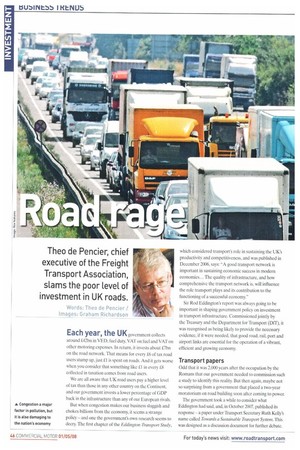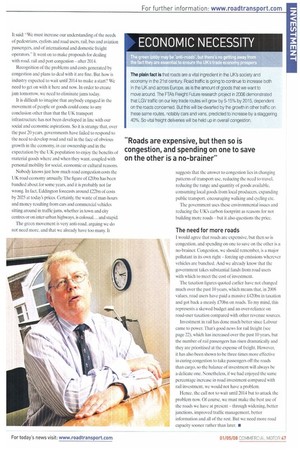Theo de Pencier, chief executive of the Freight Transport Association, slams the poor level of investment in UK roads.
Page 46

Page 47

If you've noticed an error in this article please click here to report it so we can fix it.
Words: Theo de Pencier Images: Graham Richardson
Each year, the UK government collects around I:42bn in VED, fuel duty. VAT on fuel and VAT on other motoring expenses. In return, it invests about £7bn on the road network. That means for every £6 of tax road users stump up. just £1 is spent on roads. And it gets worse when you consider that something like £1 in every £8 collected in taxation comes from road users.
We are all aware that UK road users pay a higher level of tax than those in any other country on the Continent, and our government invests a lower percentage of GDP back in the infrastructure than any of our European rivals.
But when congestion makes our business sluggish and chokes billions from the economy, it seems a strange policy — and one the government's own research seems to decry. The first chapter of the Eddington Transport Study, which considered transport's role in sustaining the UK's productivity and competitiveness, and was published in December 2006, says: "A good transport network is important in sustaining economic success in modern economies... The quality of infrastructure, and how comprehensive the transport network is, will influence the role transport plays and its contribution to the functioning of a successful economy."
Sir Rod Eddington's report was always going to be important in shaping government policy on investment in transport infrastructure. Commissioned jointly by the Treasury and the Department for Transport (Dfi), it was recognised as being likely to provide the necessary evidence, if it were needed, that good road, rail, port and airport links are essential for the operation of a vibrant, efficient and growing economy.
Transport papers
Odd that it was 2.000 years after the occupation by the Romans that our government needed to commission such a study to identify this reality. But then again, maybe not so surprising from a government that placed a two-year moratorium on road building soon after coming to power.
The government took a while to consider what Eddington had said, and, in October 2007. published its response — a paper under Transport Secretary Ruth Kelly's name called Towards a Sustainable Transport System. This was designed as a discussion document for further debate. It said: "We must increase our understanding of the needs of pedestrians, cyclists and road users, rail, bus and aviation passengers, and of international and domestic freight operators." It went on to make proposals for dealing with road, rail and port congestion — after 2014.
Recognition of the problems and costs generated by congestion and plans to deal with it are fine. But how is industry expected to wait until 2014 to make a start? We need to get on with it here and now. In order to create jam tomorrow, we need to eliminate jams today.
It is difficult to imagine that anybody engaged in the movement of people or goods could come to any conclusion other than that the UK transport infrastructure has not been developed in line with our social and economic aspirations. So it is strange that, over the past 20 years, governments have failed to respond to the need to develop road and rail in the face of obvious growth in the economy, in car ownership and in the expectation by the UK population to enjoy the benefits of material goods where and when they want, coupled with personal mobility for social, economic or cultural reasons.
Nobody knows just how much road congestion costs the UK road economy annually. The figure of £20bn has been bandied about for some years, and it is probably not far wrong. In fact, Etklington forecasts around E22bn of costs by 2025 at today's prices. Certainly, the waste of man-hours and money resulting from cars and commercial vehicles sitting around in traffic jams, whether in town and city centres or on inter-urban highways, is colossal.., and stupid.
The green movement is very anti-road, arguing we do not need more, and that we already have too many. It suggests that the answer to congestion lies in changing patterns of transport use, reducing the need to travel, reducing the range and quantity of goods available, consuming local goods from local producers, expanding public transport, encouraging walking and cycling etc.
The government uses these environmental issues and reducing the UK's carbon footprint as reasons for not building more roads — but it also questions the price.
The need for more roads
I would agree that roads are expensive, but then so is congestion, and spending on one to save on the other is a no-braincr. Congestion, we should remember, is a major pollutant in its own right — forcing up emissions wherever vehicles are bunched. And we already know that the government takes substantial funds from road users with which to meet the cost of investment.
The taxation figures quoted earlier have not changed much over the past 10 years, which means that, in 2008 values, road users have paid a massive I:420bn in taxation and got back a measly £70bn on roads. To my mind, this represents a skewed budget and an over-reliance on road-user taxation compared with other revenue sources.
Investment in rail has done much better since Labour came to power. That's good news for rail freight (see page 22), which has increased over the past 10 years. but the number of rail passengers has risen dramatically and they are prioritised at the expense of freight. However, it has also been shown to be three times more effective in curing congestion to take passengers off the roads than cargo, so the balance of investment will always be a delicate one. Nonetheless, if we had enjoyed the same percentage increase in road investment compared with rail investment, we would not have a problem.
Hence, the call not to wait until 2014 but to attack the problem now. Of course, we must make the best use of the roads we have at present — through widening, better junctions. improved traffic management, better information and all of the rest. But we need more road capacity sooner rather than later. N




















































































































































































